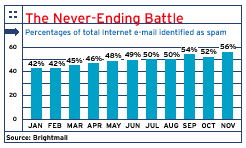Can't Top That Spam
The law calls for the Federal Trade Commission to create a do-not-spam list of e-mail addresses and prohibits spammers from disguising or hiding their identities. Spammers also are barred from harvesting addresses from Web sites and must include an opt-out option in their messages.
Convicted spammers could face penalties of up to five years in prison.

The new legislation overrides stricter spam punishments set by some states including California, where Sen. Debra Bowen's bill would charge spammers $500 per unsolicited e-mail.
"These people are unethical and immoral anyway," said Michael Neshem, executive vice president and co-founder of security solution provider Enterprise Systems Solutions, Kirkland, Wash. "They send pornography to women and children, so do you think making spam illegal is going to stop them?"
Many solution providers argue that better technology solutions, not legislation, are what is needed to combat spam. "Besides, it's much faster to implement a technology solution than it is to take a spammer to court and sue them," Neshem said.
Others argue that ISPs have been slack in their efforts to block spam.
"There are some ISPs like Earthlink that are doing a really good job filtering spam, and others who don't care if their customers are spammers as long as [the ISP is] making money," said Ron Herardian, CEO of Global System Services, Mountain View Calif.
Herardian said the majority of security vendors he works with believe the new legislation is ineffective. "Of course, spam results in business for them, so they have a vested interest, but the bottom line is spam is growing by leaps and bounds and this law will do nothing to stop it," he said.
Solution providers said spam is steadily increasing, and they expect it to spike during the holiday season.
Herardian also argued that the legislation is too little too late: Spammers have already made money and can find new ways to get around spam blockers and filters. "And what's to stop the offshore spammers, which will probably increase to avoid these laws?" he said.